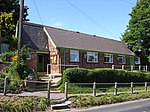Risby, East Riding of Yorkshire
Deserted medieval villages in the East Riding of YorkshireOpenDomesdayUse British English from June 2015

Risby is the site of a deserted village and former stately home in the civil parish of Rowley in the East Riding of Yorkshire, England. It is approximately 3.5 miles (5.6 km) south-west of Beverley and 1 mile (1.6 km) west of the A164 road.The area has an open partially wooded parkland, once one of the largest deer parks in Yorkshire, that is popular with local walkers. It also includes Risby Park, a farm, the Folly Lake Cafe. There are several fishponds in the ornamental lakes of the former hall, which have been operated as coarse fishing locations since 1990. The site also has an octagonal brick folly that is designated Grade II.
Excerpt from the Wikipedia article Risby, East Riding of Yorkshire (License: CC BY-SA 3.0, Authors, Images).Risby, East Riding of Yorkshire
Dunflat Road,
Geographical coordinates (GPS) Address Nearby Places Show on map
Geographical coordinates (GPS)
| Latitude | Longitude |
|---|---|
| N 53.80077 ° | E -0.470167 ° |
Address
Dunflat Road
Dunflat Road
HU17 8PP
England, United Kingdom
Open on Google Maps











